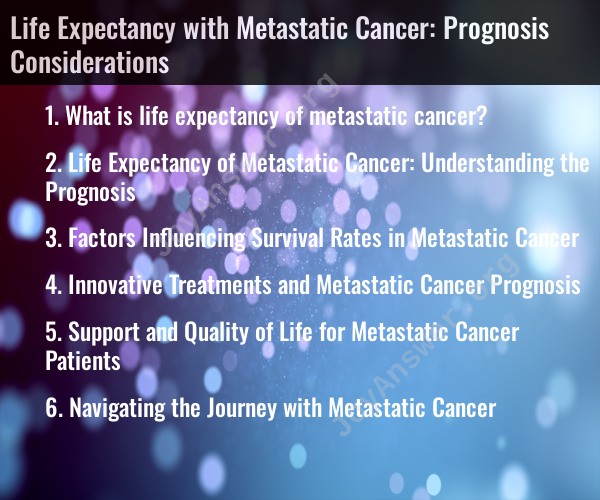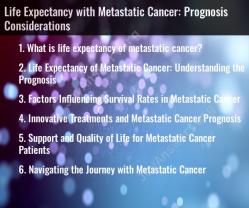What is life expectancy of metastatic cancer?
The life expectancy of a person with metastatic cancer varies widely depending on several factors, including the type of cancer, the stage at which it was diagnosed, the location of metastases, the individual's overall health, and the effectiveness of treatment. Metastatic cancer, also known as stage IV cancer, is characterized by the spread of cancer cells from the primary tumor to other parts of the body.
It's essential to understand that a metastatic cancer diagnosis is generally associated with a more serious prognosis than early-stage cancer. While some individuals with metastatic cancer may respond well to treatment and achieve long-term remission, for others, the prognosis may be more limited.
Key factors that can influence the prognosis of metastatic cancer include:
Type of Cancer: Different types of cancer have different rates of metastasis and response to treatment. Some metastatic cancers are more aggressive than others.
Stage at Diagnosis: The stage at which metastatic cancer is initially diagnosed can significantly impact the prognosis. Early detection, even at the metastatic stage, may offer more treatment options and better outcomes.
Location of Metastases: The location of metastases in the body can affect prognosis. Metastases in vital organs or the brain, for example, may be more challenging to treat.
Overall Health: The individual's overall health and ability to tolerate treatment are important factors. A person with a strong immune system and good general health may respond better to treatment.
Treatment Options: Advances in cancer treatment have led to new therapies and targeted treatments that can extend survival. The availability of effective treatments can significantly influence prognosis.
Response to Treatment: How the cancer responds to treatment is a critical factor. Some individuals experience positive responses to therapy and may achieve long-term remission.
Supportive Care: Supportive care, including palliative care, can improve the quality of life for individuals with metastatic cancer, even if the cancer is not curable.
It's important to note that metastatic cancer is a complex and individualized condition, and general statistics may not apply to each person's unique situation. Some individuals may live for many years with metastatic cancer, while others may have a shorter life expectancy. Prognosis is best discussed with a healthcare team who can provide information tailored to the specific diagnosis, treatment plan, and response to treatment.
Furthermore, advances in cancer research and treatment continue to improve the outlook for people with metastatic cancer. Clinical trials and personalized treatment approaches are expanding the options available to patients, offering hope for improved outcomes. If you or a loved one is facing a metastatic cancer diagnosis, it's important to work closely with a healthcare team to discuss treatment options, prognosis, and supportive care to make informed decisions.
Life Expectancy of Metastatic Cancer: Understanding the Prognosis
Metastatic cancer is cancer that has spread from its original location to other parts of the body. The life expectancy of metastatic cancer varies depending on the type of cancer, the stage of diagnosis, and the individual patient's overall health and response to treatment.
In general, the prognosis for metastatic cancer is worse than for localized cancer. However, there have been significant advances in cancer treatment in recent years, and many people with metastatic cancer are now living longer and healthier lives.
Factors Influencing Survival Rates in Metastatic Cancer
There are a number of factors that can influence survival rates in metastatic cancer, including:
- The type of cancer: Some types of cancer, such as melanoma and breast cancer, have better prognoses than others.
- The stage of diagnosis: The earlier metastatic cancer is diagnosed, the better the prognosis.
- The individual patient's overall health: Patients with other health conditions, such as heart disease or diabetes, may have a worse prognosis.
- The patient's response to treatment: Some patients respond better to treatment than others.
Innovative Treatments and Metastatic Cancer Prognosis
There are a number of innovative treatments that are being used to treat metastatic cancer, including targeted therapy, immunotherapy, and precision medicine. These treatments are often more effective and have fewer side effects than traditional chemotherapy and radiation therapy.
Targeted therapy drugs target specific molecules that are involved in cancer growth and survival. Immunotherapy drugs help the body's own immune system to fight cancer cells. Precision medicine uses genetic information to tailor treatments to individual patients.
These innovative treatments have led to significant improvements in survival rates for many people with metastatic cancer.
Support and Quality of Life for Metastatic Cancer Patients
There are a number of things that can be done to support and improve the quality of life for metastatic cancer patients, including:
- Medical care: Patients should have access to the best possible medical care, including treatment for their cancer and management of any side effects.
- Palliative care: Palliative care is specialized care that focuses on relieving the symptoms and stress associated with cancer and other serious illnesses.
- Psychosocial support: Patients and their families may benefit from psychosocial support, such as counseling and support groups.
Navigating the Journey with Metastatic Cancer
Navigating the journey with metastatic cancer can be challenging. However, there are a number of resources available to help patients and their families. These resources include:
- The patient's cancer care team: The patient's cancer care team can provide information and support.
- Cancer organizations: There are a number of cancer organizations that offer support and resources for patients and their families.
- Online communities: There are a number of online communities where patients and their families can connect with each other for support.
It is important to remember that everyone's journey with metastatic cancer is different. There is no right or wrong way to cope. The most important thing is to find what works for you and your family.




